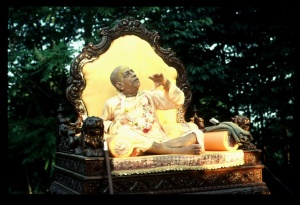SB 7.14.19: Difference between revisions
m (1 revision(s)) |
(Vanibot #0018 edit: make synonym terms in Sanskrit italic in SB - Vanisource) |
||
| Line 1: | Line 1: | ||
{{info | {{info | ||
|speaker= | |speaker=Nārada Muni | ||
|listener=King | |listener=King Yudhiṣṭhira | ||
}} | }} | ||
[[Category:Srimad-Bhagavatam - Canto 07 Chapter 14]] | |||
[[Category:Bhagavatam Verses Spoken by Narada Muni - Vanisource|071419]] | |||
<div style="float:left">'''[[Srimad-Bhagavatam]] - [[SB 7|Seventh Canto]] - [[SB 7.14: Ideal Family Life|Chapter 14: Ideal Family Life]]'''</div> | |||
<div style="float:right">[[File:Go-previous.png|link=SB 7.14.18]] '''[[SB 7.14.18]] - [[SB 7.14.20-23]]''' [[File:Go-next.png|link=SB 7.14.20-23]]</div> | |||
{{RandomImage}} | |||
==== TEXT 19 ==== | ==== TEXT 19 ==== | ||
<div | <div class="verse"> | ||
kuryād apara-pakṣīyaṁ | :kuryād apara-pakṣīyaṁ | ||
māsi prauṣṭha-pade dvijaḥ | :māsi prauṣṭha-pade dvijaḥ | ||
śrāddhaṁ pitror yathā-vittaṁ | :śrāddhaṁ pitror yathā-vittaṁ | ||
tad-bandhūnāṁ ca vittavān | :tad-bandhūnāṁ ca vittavān | ||
</div> | </div> | ||
| Line 17: | Line 22: | ||
==== SYNONYMS ==== | ==== SYNONYMS ==== | ||
<div | <div class="synonyms"> | ||
''kuryāt''—one should perform; ''apara-pakṣīyam''—during the fortnight of the dark moon; ''māsi''—in the month of Āśvina (October-November); ''prauṣṭha-pade''—in the month of Bhādra (August-September); ''dvijaḥ''—twice-born; ''śrāddham''—oblations; ''pitroḥ''—unto the forefathers; ''yathā-vittam''—according to one's means of income; ''tat-bandhūnām ca''—as well as relatives of forefathers; ''vitta-vān''—one who is sufficiently rich. | |||
</div> | </div> | ||
| Line 24: | Line 29: | ||
==== TRANSLATION ==== | ==== TRANSLATION ==== | ||
<div | <div class="translation"> | ||
A brāhmaṇa who is sufficiently rich must offer oblations to the forefathers during the dark-moon fortnight in the latter part of the month of Bhādra. Similarly, he should offer oblations to the relatives of the forefathers during the mahālayā ceremonies in the month of Āśvina.* | A brāhmaṇa who is sufficiently rich must offer oblations to the forefathers during the dark-moon fortnight in the latter part of the month of Bhādra. Similarly, he should offer oblations to the relatives of the forefathers during the mahālayā ceremonies in the month of Āśvina.* | ||
</div> | </div> | ||
__NOTOC__ | |||
<div style="float:right; clear:both;">[[File:Go-previous.png|link=SB 7.14.18]] '''[[SB 7.14.18]] - [[SB 7.14.20-23]]''' [[File:Go-next.png|link=SB 7.14.20-23]]</div> | |||
__NOTOC__ | |||
__NOEDITSECTION__ | |||
Revision as of 05:53, 1 December 2017

A.C. Bhaktivedanta Swami Prabhupada
TEXT 19
- kuryād apara-pakṣīyaṁ
- māsi prauṣṭha-pade dvijaḥ
- śrāddhaṁ pitror yathā-vittaṁ
- tad-bandhūnāṁ ca vittavān
SYNONYMS
kuryāt—one should perform; apara-pakṣīyam—during the fortnight of the dark moon; māsi—in the month of Āśvina (October-November); prauṣṭha-pade—in the month of Bhādra (August-September); dvijaḥ—twice-born; śrāddham—oblations; pitroḥ—unto the forefathers; yathā-vittam—according to one's means of income; tat-bandhūnām ca—as well as relatives of forefathers; vitta-vān—one who is sufficiently rich.
TRANSLATION
A brāhmaṇa who is sufficiently rich must offer oblations to the forefathers during the dark-moon fortnight in the latter part of the month of Bhādra. Similarly, he should offer oblations to the relatives of the forefathers during the mahālayā ceremonies in the month of Āśvina.*